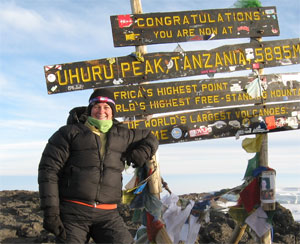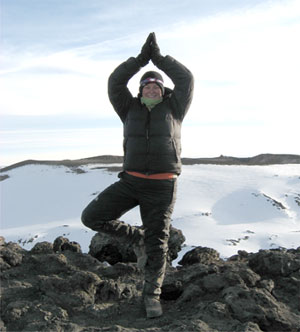 |
| Congratulations! Jessie Sheppard climbed Africa's highest point as part of a Joints in Motion team. (Photo courtesy of Jessie Sheppard) |
My adventure began in the rainforest at the foot of Mount Kilimanjaro. After the chaos of dividing luggage among the porters, we began our ascent of the mountain. My brand new hiking boots didn't know what was in store for them as they squished their way uphill into the rainforest.
The first two days of hiking, though long, were relatively easy. We very quickly hit the cloudline. Once we walked through it, we were treated to bright sunshine and spectacular views for the remainder of the journey.
Day three of our hike was the first real challenge for me. That day, we ascended to approximately 14,000 feet in order to acclimatize before heading back down to camp at around 12,000 feet. Though we moved pole pole (slowly, in Swahili), many of us quickly found ourselves short of breath and headachy from the altitude. We hiked for nearly nine hours that day, and I found myself going to my happy place—thoughts of my wonderful fiancé Dylan and our dog Roxy—many, many times before we reached camp.
Day four was another challenge, at least for me. A little secret: I am not the most sure-footed individual, and climbing has never been my forte (I can't even recall climbing a single tree in my childhood.). So day four had me testing my limits as we climbed a rather sheer rock face that would have us gaining several hundred feet in altitude in the course of a little over an hour.
It went a little something like this:
Guide: “Just put your foot up here, and your hand here, and pull yourself up.”
Me: “Um, Dao, that foothold is at my shoulder.”
Although challenging, this climb was great fun. I initiated an army song (you know, “I don't know but I've been told....”) that had 10 verses by the end of our days on the mountain; even the porters began making up verses. We sang all the way up that mountain, and all the way down again.
Day five, the day of truth. After hiking about four hours, we ate dinner and were in bed by 6 p.m. Many of us, myself included, lay awake, tossing and turning, until our wake-up call at 10 p.m. We ate bowls of hot porridge, donned ALL of our warm weather gear and our headlamps, and began our summit attempt.
This night and the following day were, by far, the most difficult hours of my life. Despite having run a marathon, completed many triathlons, and having swum the Northumberland Strait, Summit Night was the most mentally and physically challenging thing I have ever done. We hiked extremely slowly, about one step every five seconds or so, up the steep incline of the mountain. All I could see were the feet of the people in front of me, lit by my headlamp, the stars, and the snow on the peak of Kili.
Our task was to gain nearly 5,000 feet in altitude this night, and many of us felt the effects of the decreased oxygen in the air very intensely. I was extremely dizzy for several hours, and it was all I could do to steady myself on the loose scree as we climbed. My thoughts became primal: breathe; step; breathe; step; BREATHE.
We hiked for nearly eight hours, through the night, until we reached Stella’s Point. As we plodded on, we watched many people being hurried down the mountain by porters as the effects of altitude sickness made it impossible for them to carry on. At Stella’s Point, we had about one to 1.5 hours left to go until the summit, and only a 200-foot gain in altitude. I had prepared myself mentally for this: I told myself that if I could make it to Stella’s Point, I could go all the way. In the final steps as we reached this landmark, the horizon began to brighten to my right, and my entire perspective changed. The group hugged and laughed and cried a little when we reached Stella’s, and then we braced ourselves for the final summit.
 |
| Practising those yoga moves on the summit of Kilimanjaro. (Photo courtesy of Jessie Sheppard) |
I tried my best to enjoy the last hours of climbing and took many pictures as the sun bounced off of the glaciers surrounding me. Soon, I saw the famous summit sign in the distance, and it took my breath away (even more than the altitude already had!). Nothing compares to the feeling of elation as I reached the summit with all the new friends I had made over the past week. We took the requisite pictures, and all too soon began the descent back down to camp.
At this point, the sun had thawed the scree that we had walked up, and our descent consisted of a running slide downhill, carried by loose stones, for about four hours. It was great fun! Breathing got easier as we reached our camp after over 12 hours of hiking. We weren’t finished yet though—we stopped for a short lunch break, packed up camp, and headed downhill for another four hours. This, after having had only 1.5 hours of sleep and having hiked through the night and the morning, was excruciatingly difficult.
Our final day on the mountain was a four-hour descent through the rainforest, trying to collect our thoughts and understand the accomplishment that we had just achieved. Though the mountain has only a 40 to 50 per cent success rate, most of our group made the summit. All of us, however, walked back down that mountain and towards our lives in Canada with a sense of wonder, both in our own personal journeys on Kilimanjaro and in the strength of the team that we had formed, all driven by a passion to raise money for individuals living with arthritis.
Jessie Sheppard is a Dalhousie master's student in health promotion. Besides climbing Mount Kilimanjaro, she also swam the Northumberland Strait for Joints in Motion.
